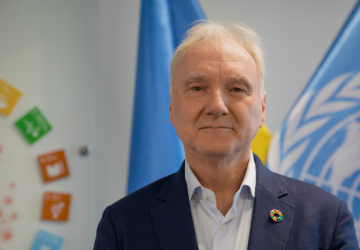The humanitarian crisis in Nigeria’s North-East has seen a staggering amount of funding aimed at alleviating the suffering of millions displaced by Boko Haram violence, with over N2.48 trillion spent on aid in just two years.
Former United Nations Resident and Humanitarian Coordinator for Nigeria, Matthias Schmale, revealed that the United Nations raised and spent $1.5 billion (approximately N2.489 trillion) during his tenure between 2022 and 2023. This significant sum was directed at providing life-saving aid to communities affected by the ongoing Boko Haram insurgency.
In an exclusive interview with Daily Sun, Schmale, who currently serves as the UN Resident and Humanitarian Coordinator in Ukraine, shared insights from his time in Nigeria and the challenges faced by the region.
“Millions of people were reached with essential humanitarian aid, including shelter, food, non-food items, and protection,” Schmale said, highlighting the UN’s broad response to the crisis. The funds were primarily used to support people displaced by Boko Haram terrorists, who have terrorized the region for over a decade, leaving widespread destruction in their wake.
The humanitarian effort was part of a larger response by the international community, with the UN launching a humanitarian response plan in 2021 that aimed to raise $1 billion to support 6.4 million vulnerable people in the North-East. This plan sought to address the dire needs of displaced populations, providing critical services such as food distribution, healthcare, shelter, and protection.
Despite the huge investment, Schmale emphasized that the toll on the civilian population remains high. “During my regular field missions to the North East, it was evident that the civilian population continued to pay a very high price as a result of the violence inflicted by Boko Haram,” he explained. The insurgents’ brutal tactics have left many communities devastated, with millions living in makeshift camps and struggling to access basic necessities.
Schmale also praised the resilience of the Nigerian people, despite the overwhelming challenges. “I have the fondest memories of my time in Nigeria,” he said, acknowledging the entrepreneurial energy of Nigerians, even in the face of extreme hardship. “Despite more than 130 million citizens facing multidimensional poverty and the long-standing Boko Haram insurgency in the North East, I was deeply impressed by the enormous entrepreneurial energy and commitment of Nigeria’s citizens to overcome these significant obstacles and to improve their lives.”
The former UN envoy’s remarks shed light on the complex situation in the North-East. While humanitarian aid has provided much-needed support, the ongoing insecurity continues to undermine efforts to restore stability and peace to the region. Schmale emphasized that overcoming the insurgency requires a collaborative approach between the countries of the Lake Chad Basin, which includes Nigeria, Chad, Niger, and Cameroon.
“It is evident that the insurgency affects all Lake Chad countries and that working together is a must to overcome it,” Schmale stated. He pointed out that the UN is working at both the country and regional levels with all Lake Chad countries to enable a more dignified life for the people living in the region.
While Schmale expressed respect for the Nigerian government and the various non-governmental organizations (NGOs) working in the region, he acknowledged the immense challenges faced by all parties involved in the humanitarian response. “I have huge respect for the state authorities, the UN, and the many NGOs involved in addressing and overcoming the humanitarian challenges to the best of collective abilities,” he said.
The situation in the North-East remains dire, with over two million people displaced by Boko Haram violence, according to the UN. Many of these displaced individuals live in camps where conditions are often overcrowded and unsanitary. Access to food, clean water, and healthcare remains limited, and the psychological toll of living through years of conflict is significant.
In addition to food and shelter, protection is a key area of focus in the humanitarian response. The insurgency has exacerbated vulnerabilities, particularly for women and children, who are often subjected to violence and exploitation. The UN and its partners have worked to provide child protection services, prevent gender-based violence, and ensure that displaced populations have access to basic rights and dignity. “Helping people is vital, but lasting peace and stability are essential for people to rebuild their lives,” Schmale concluded

